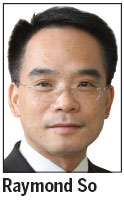Aging population hurts development
Updated: 2013-10-24 06:42
By Raymond So(HK Edition)
|
|||||||
Hong Kong is facing an aging population. However, there are not many discussions in society or enough awareness on this subject. People are more concerned about issues relevant to their current lives. Aging is such a distant subject it does not catch people's attention. To many people, it is the problem of the government. In simple words, who cares?
Actually many scholars and researchers care. For the first time in human history, the number of aged people exceeds that of young people. At the beginning of the 1900s, the life expectancy of men was 46 years, and that of women was similar. Thanks to advances in technology, medical sciences and better nutrition, the life expectancy of men in 1950 increased to 65, while that of women increased to nearly 70. Nowadays a normal man can be expected to live 80 years and a woman is expected to live 86 years. The support for people's post-retirement living becomes a great burden.
To worsen the situation, the fertility rate decreases. Fifty years ago, it was quite common to have four or five children. Today, the fertility rate is only slightly above 1, which can hardly replace the existing population. For a society to keep its population constant requires a fertility rate of 2.2. When the fertility rate is so low and the life expectancy is getting higher, it is no surprise that the problem of an aging population will get worse.
Japan demonstrates the adverse impacts of an aging population. It was hit badly by the crash in the real-estate market in the early 1990s. By then the Japanese economy had been sluggish for nearly 20 years. One reason for its slowdown was there were not enough young people. When old people start to retire, they have no income and have to live on their savings. This has an impact on society's consumption patterns, as old people tend to spend less. With the decrease in consumption, production is affected as the demand for goods becomes lower. Furthermore, young people are more creative and they can accept new ideas quickly. These turn into society's creativity. However, the aging population will mean fewer young people and hence less creativity. It is not surprising to see the Japanese economy struggle to recover due to a lack of younger people.

From the Japanese experience, Hong Kong should try to reduce the adverse impacts of its aging population. Three measures are commonly used. The first one is for more young people to immigrate to Hong Kong. This is a tricky issue because currently there are strong voices asking the government to reduce the inflow of people to Hong Kong. The idea of attracting more young people to the city is not an easy one, due to the shortage of other supporting facilities.
The second method often mentioned is encouraging young couples to have more children. Again, worldwide experience shows that having children is an individual decision and not one affected by government policies. Many governments around the globe have introduced incentive schemes to encourage people to have more children, but with little success. The paradox is that the better-educated young couple will not have more children because of the incentives, while those on social security will have more children in order to get more benefits from the society. The original idea of getting better future support turns into a greater social burden.
The third way is to delay the retirement age. Again, this is easier said than done. Delaying the retirement age lowers the government's burden on elderly support. However, those who are next to the succession ladder will have to wait longer. Also, a fixed retirement age becomes less trendy because different jobs will have different job requirements and hence retirement age. Delaying the retirement age may also provoke a new round of disagreement, as worldwide experience suggests that delaying retirement is a welcome move.
Aging is such an important issue we should not overlook it. The government should alert people to the problem's seriousness, which cannot be solved simply through more social benefits for the elderly. A holistic approach is definitively needed. But given the current climate, can we introduce any big change?
The author is dean of the School of Business at Hang Seng Management College.
(HK Edition 10/24/2013 page8)